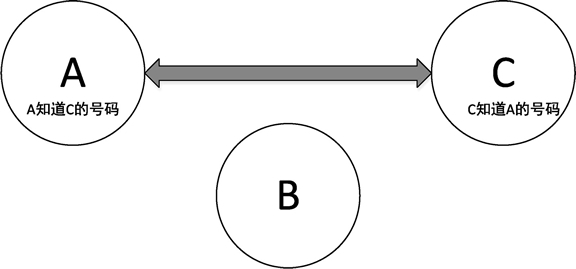Day09(MapAndContainer)
集合(map) 和容器(Container)
Map
Map 是一种无序键值对的集合,通过
Key来检索数据,key类似索引,指向数据值,可以使用for迭代,但是map是无序的,无法决定他的返回值顺序,这是因为map是使用hash来实现的
删除元素、判断是否存在
1
2
3
4
5
6
7
8
9
10
11
12
13
14
15
16
17
18
19
20
21
22
23
24
25
26
27
28
29
package main
import (
"github.com/Cc360428/HelpPackage/UtilsHelp/logs"
)
func main() {
m1 := map[string]string{
"name1": "lcc",
"name2": "Cc",
"name3": "Cc360428"}
logs.Info(m1)
m2 := make(map[int]int)
m2[1] = 11
m2[2] = 22
m2[3] = 33
m2[4] = 44
m2[5] = 55
logs.Info(m2)
delete(m2, 4)
logs.Info(m2)
if v, ok := m2[88]; !ok {
// ok 存在返回true 反之 false
logs.Info("check key no")
} else {
// 当不存在就返回默认值
logs.Info("check key is:", v)
}
}
1
2
3
4
2020/04/25 10:30:05.829 [I] [map.go:12] map[name1:lcc name2:Cc name3:Cc360428]
2020/04/25 10:30:05.858 [I] [map.go:19] map[1:11 2:22 3:33 4:44 5:55]
2020/04/25 10:30:05.858 [I] [map.go:21] map[1:11 2:22 3:33 5:55]
2020/04/25 10:30:05.858 [I] [map.go:24] check key no
Container(heap、list、ring)
- 单链表结构
-
双链表结构与删除
知道上一个下一个,删除时要告诉上一个下个删除
- 双向链表与环形链表
heap(堆)
- heap 包提供了对任意类型(实现了
heap.Interface接口)的堆操作。(最小)堆是具有“每个节点都是以其为根的子树中最小值”属性的树。 - 树的最小元素为其根元素,索引
0的位置。 heap是常用的实现优先队列的方法。要创建一个优先队列,实现一个具有使用(负的)优先级作为比较的依据的 Less 方法的 Heap 接口,如此一来可用 Push 添加项目而用 Pop 取出队列最高优先级的项目。- 实现优先队列
1
2
3
4
5
6
7
8
9
10
11
12
13
14
15
16
17
18
19
20
21
22
23
24
25
26
27
28
29
30
31
32
33
34
35
36
37
38
39
40
41
42
43
44
45
46
47
48
49
50
51
52
53
54
55
56
57
58
59
60
61
62
63
64
65
66
67
68
69
70
71
72
73
74
75
76
77
78
79
80
81
package main
import (
"container/heap"
"fmt"
)
type Item struct {
value string // 优先级队列中的数据,可以是任意类型,这里使用string
priority int // 优先级队列中节点的优先级
index int // index是该节点在堆中的位置
}
// 优先级队列需要实现heap的interface
type PriorityQueue []*Item
// 绑定Len方法
func (pq PriorityQueue) Len() int {
return len(pq)
}
// 绑定Less方法,这里用的是小于号,生成的是小根堆
func (pq PriorityQueue) Less(i, j int) bool {
return pq[i].priority < pq[j].priority
}
// 绑定swap方法
func (pq PriorityQueue) Swap(i, j int) {
pq[i], pq[j] = pq[j], pq[i]
pq[i].index, pq[j].index = i, j
}
// 绑定put方法,将index置为-1是为了标识该数据已经出了优先级队列了
func (pq *PriorityQueue) Pop() interface{} {
old := *pq
n := len(old)
item := old[n-1]
*pq = old[0 : n-1]
item.index = -1
return item
}
// 绑定push方法
func (pq *PriorityQueue) Push(x interface{}) {
n := len(*pq)
item := x.(*Item)
item.index = n
*pq = append(*pq, item)
}
// 更新修改了优先级和值的item在优先级队列中的位置
func (pq *PriorityQueue) update(item *Item, value string, priority int) {
item.value = value
item.priority = priority
heap.Fix(pq, item.index)
}
func main() {
// 创建节点并设计他们的优先级
items := map[string]int{"二毛": 5, "张三": 3, "狗蛋": 9}
i := 0
pq := make(PriorityQueue, len(items)) // 创建优先级队列,并初始化
for k, v := range items { // 将节点放到优先级队列中
pq[i] = &Item{
value: k,
priority: v,
index: i}
i++
}
heap.Init(&pq) // 初始化堆
item := &Item{ // 创建一个item
value: "李四",
priority: 1,
}
heap.Push(&pq, item) // 入优先级队列
pq.update(item, item.value, 6) // 更新item的优先级
for len(pq) > 0 {
item := heap.Pop(&pq).(*Item)
fmt.Printf("%.2d:%s index:%.2d\n", item.priority, item.value, item.index)
}
}
1
2
3
4
03:张三 index:-01
05:二毛 index:-01
06:李四 index:-01
09:狗蛋 index:-01
list(双向链表)
双向链表 ,
Element元素是链接列表的元素
MoveBefore:给定的元素移动到另一个元素的前面MoveAfter:给定的元素移动到另一个元素的后面MoveToFront:把给定的元素移动到链表的最前端MoveToBack:把给定的元素移动到链表的最后端Front:获取链表中最前端Back:获取链表中最后端InsertBefore:指定的元素之前插入新元素InsertAfter:指定的元素之后插入新元素PushFront:用于在链表的最前端插入新元素。PushBack:用于在链表的最前端插入新元素。
1
2
3
4
5
6
7
8
9
10
11
12
13
14
15
16
17
18
19
20
21
22
23
24
25
26
27
28
29
30
31
32
33
34
35
36
37
38
39
40
41
42
43
44
45
46
47
48
package main
import (
"container/list"
"fmt"
"github.com/Cc360428/HelpPackage/UtilsHelp/logs"
)
func main() {
listType := list.New()
// 尾部添加
listType.PushFront("lcc")
listType.PushFront(18)
// 头部添加
listType.PushFront("hello")
for e := listType.Front(); e != nil; e = e.Next() {
fmt.Print(e.Value, " ")
}
fmt.Print("\n")
for e := listType.Front(); e != nil; e = e.Next() {
if e.Value == "hello" {
// 指定元素之后插入新元素
listType.InsertAfter("World", e)
}
if e.Value == "lcc" {
// 指定元素之前插入新元素
listType.InsertBefore("Cc", e)
}
}
for e := listType.Front(); e != nil; e = e.Next() {
fmt.Print(e.Value, " ")
}
fmt.Print("\n")
for e := listType.Back(); e != nil; e = e.Next() {
fmt.Print(e.Value)
}
// 最前元素
logs.Info(listType.Front().Value)
// 最后元素
logs.Info(listType.Back().Value)
for e := listType.Front(); e != nil; e = e.Next() {
if e.Value == "lcc" {
// 指定元素之前插入新元素
listType.MoveBefore(e, e)
}
}
}
1
2
3
4
hello 18 lcc
hello World 18 Cc lcc
lcc2020/04/25 16:16:21.548 [I] [list.go:39] hello
2020/04/25 16:16:21.577 [I] [list.go:41] lcc
ring(环)
ring 实现了环形链表的操作
1
2
3
4
5
6
7
8
9
10
11
12
13
14
15
16
17
18
19
20
21
22
23
24
25
26
27
28
29
30
31
32
package main
import (
"container/ring"
"github.com/Cc360428/HelpPackage/UtilsHelp/logs"
)
func main() {
ring1 := ring.New(3)
for i := 1; i <= 3; i++ {
ring1.Value = i
ring1 = ring1.Next()
}
ring2 := ring.New(3)
for i := 0; i <= ring2.Len(); i++ {
ring2.Value = i
ring2 = ring2.Next()
}
r := ring1.Link(ring2)
logs.Info(r.Len())
r.Do(func(p interface{}) {
logs.Info(p.(int))
})
logs.Info(r.Value)
logs.Info(r.Next().Value)
logs.Info(r.Prev().Value)
// ring 的遍历
for p := r.Next(); p != r; p = p.Next() {
logs.Info(p.Value.(int))
}
}
1
2
3
4
5
6
7
8
9
10
11
12
13
14
15
2020/04/25 16:15:42.181 [I] [ring.go:20] 6
2020/04/25 16:15:42.216 [I] [ring.go:23] 2
2020/04/25 16:15:42.216 [I] [ring.go:23] 3
2020/04/25 16:15:42.216 [I] [ring.go:23] 1
2020/04/25 16:15:42.216 [I] [ring.go:23] 1
2020/04/25 16:15:42.216 [I] [ring.go:23] 2
2020/04/25 16:15:42.216 [I] [ring.go:23] 3
2020/04/25 16:15:42.216 [I] [ring.go:25] 2
2020/04/25 16:15:42.216 [I] [ring.go:26] 3
2020/04/25 16:15:42.216 [I] [ring.go:27] 3
2020/04/25 16:15:42.216 [I] [ring.go:30] 3
2020/04/25 16:15:42.216 [I] [ring.go:30] 1
2020/04/25 16:15:42.217 [I] [ring.go:30] 1
2020/04/25 16:15:42.218 [I] [ring.go:30] 2
2020/04/25 16:15:42.218 [I] [ring.go:30] 3
This post is licensed under
CC BY 4.0
by the author.



